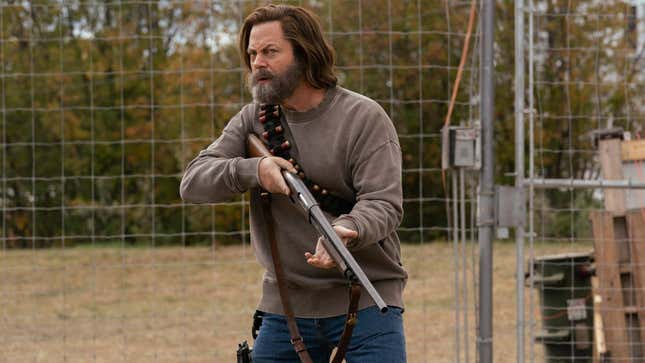
Spoiler warning: The following discusses details and events from the third episode of The Last Of Us, “Long Long Time” as well as story elements from the corresponding chapter of the game.
You may have heard murmurings about the third episode of The Last Of Us spreading like a fungus extending its tendrils (sorry, that will be the last tendril reference in this piece, promise) through the pop-culture landscape over the past couple of weeks. According to critics who had seen it ahead of time, this episode was supposed to be one of the best so far, maybe even of the entire series. Indeed, our recapper David Cote gave it an A. As he noted, episode three hit like a ton of bricks, and it’s all because the show’s creators—Neil Druckmann and Craig Mazin—allowed themselves the freedom to take a major departure from the game.
For a show that was billed as one of the most faithful adaptations of a video game ever made, it’s already taken a few notable liberties with the source material. They’ve mostly been minor changes that fill in gaps, compress or expand the time frame, fix some logical inconsistencies, and generally make things easier to shoot in live action. None of it has fundamentally changed anything that happens in the game, though. For example, Tess’ death in the last episode played out differently, but the end result was the same—she got bitten and sacrificed herself to buy Joel and Ellie time to escape. In “Long Long Time,” though, Druckmann and Mazin made their riskiest change yet. In doing so, they gave us a beautifully rendered love story about two men making a home for themselves at the end of the world.
For those who haven’t played the game, watched the 10-hour cinematic playthrough on YouTube, or simply need your memory jogged, the sweet backstory between Bill and Frank is never shown, only alluded to. And by the time we meet Bill—who is still very much alive when Joel and Ellie reach the town—it’s gone sour. Like his show counterpart, this version of Bill is extremely cautious and skeptical of strangers. As you can imagine, he doesn’t appreciate Joel bringing this girl into his fortified town without warning. The constant bickering between Bill and Ellie is one of the unfortunate casualties of this adaptation. It’s a shame we’ll never get to see them meet in live action. But if that’s the price we have to pay for this moving to be told instead, it’s worth it.

The goal of this level—to acquire a working battery and then a car—was actually borrowed for the premiere episode (the broken deal with Robert originally involved guns), so that should probably have been the first clue that something down the line would have to be adjusted. The fact that Bill and Frank are mentioned repeatedly as Tess and Joel’s smuggling connection was another one. Knowing what we know now, that Depeche Mode song takes on brand new meaning: “I’m taking a ride with my best friend.” Sniff. How did all this dust get in here? Anyway, back to the game.
After fighting your way through to the place where the battery is supposed to be, you discover that Frank has stolen it first. At this point, Joel doesn’t even know who Frank is; Bill simply describes him as his “partner.” Later on, you come upon a gruesome scene inside a house where Frank has hung himself after being bitten several times. The only other mention of their potential relationship is a note you find from Frank to Bill in which it’s clear whatever was between them has been replaced by bitterness. No sweet Linda Ronstadt serenades here. There’s also a cut scene later in the game when Ellie is in the truck and finds a magazine full of pictures of naked men (this might still happen), so if you paid attention you could read between the lines.
What’s significant about this detour is that not only does it make the implicit relationship explicit, it shows careful thought on the part of the creators about the differences between a video game and a TV show. One of the early criticisms thrown around before HBO’s adaptation premiered was that there wasn’t any point in remaking the game for TV when it already exists in a form that’s legitimately cinematic. Putting aside the value of that argument (which falls apart when you consider viewers who have no desire to ever play the game), the way to counter it is to do exactly what Mazin and Druckmann have done here. Take something only hinted at in the game and expand upon it in ways the game never could. Cast great actors like Nick Offerman and Murray Bartlett and give them the time and space to tell a complicated, emotional, self-contained story that requires nothing of the viewer except to take it all in. Show us a piece of this world we’ve never seen before. That’s something you can only get in a television series, and it’s all the better for it. Even a movie couldn’t do that.
We know from certain casting announcements and glimpses of future episodes that this won’t be the only divergence from the game, but it’s an early statement of intent by the creators. They’re telling us plainly, if you think you’ve seen this story before—no, you haven’t.